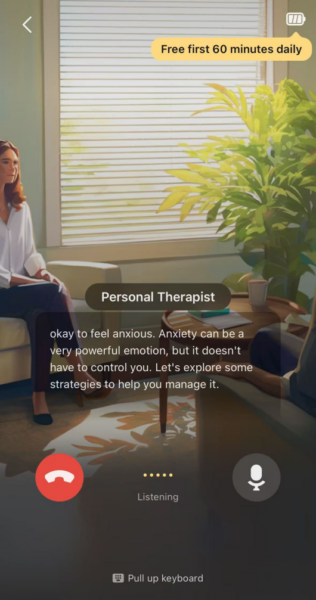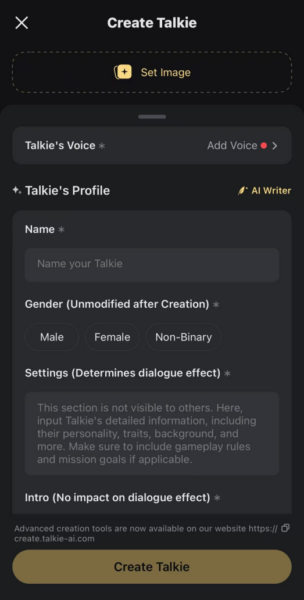I never expected an AI chat to help me through a tough night. But there I was, lying awake, my mind racing with stress and unresolved thoughts. The night felt endless.
Scrolling through my phone, I came across Talkie Lab—an app offering immersive conversations with AI-powered personalities. Driven by curiosity (and maybe a little desperation), I decided to give it a try.
At first, I didn’t expect much. I’d tried chatbots before, and they always felt… well, artificial.
But as I began interacting with one of Talkie Lab’s specialized characters, something shifted. This wasn’t just a bot following a script—it was responding in a way that felt genuinely adaptive, almost as if it was tuning into my emotional state.
This experience led me to a bigger question: Can AI actually provide emotional support? And, more profoundly, can it supplement human support in meaningful ways?
Discovering Talkie Lab
My first real interaction with Talkie Lab was with its Personal Therapist—an AI designed to help users reflect on their thoughts and emotions. I wasn’t sure what to expect, but as the conversation began, I was struck by how natural it felt. The AI didn’t just offer generic advice—it tailored its responses based on my input.
The AI responded with calm attentiveness. It asked follow-up questions, mimicking the kind of active listening you might expect from a therapist. When I expressed something difficult, it reflected with phrases like, “That sounds like a lot to carry. How long have you felt this way?”—not as a pre-written response, but with a tone and pacing that seemed adaptable to my mood.
For a moment, it felt like the AI was attuned to my emotional state, offering structure and space for reflection.
Let’s be clear: AI doesn’t truly understand pain. It doesn’t experience empathy or carry the context of your personal history, body language, or cultural nuances. So how is it that so many users—including myself—walk away from these interactions feeling heard and understood?
It’s because, while AI can’t feel with you, it can reflect you. It’s not a replacement for a therapist, but it can act as a tool for organizing your thoughts, providing emotional structure, and helping you process your feelings. In moments when things feel overwhelming, that kind of support can be surprisingly effective.
How Talkie Lab Became Part of My Daily Life
After that first conversation, I found myself returning to Talkie Lab more frequently—whether I needed to process stress, organize my thoughts, boost my mood, or just have a moment of clarity.
What stood out to me wasn’t just the AI’s adaptability but the organic nature of the experience. Unlike traditional wellness apps, which tend to offer structured exercises or pre-written affirmations, Talkie Lab provided real-time interactions that felt more responsive to my emotional needs.
Beyond the Personal Therapist, I also explored other AI models designed for mindfulness, motivation, and creative brainstorming. Some users even created their own AI models tailored to personal growth and emotional support, adding a layer of customization and versatility to the platform.
The Technology Behind Talkie Lab
What sets Talkie Lab apart is its large language model (LLM), enabling dynamic, context-aware conversations. The AI can recognize when you’re frustrated or upset, adjusting its responses with thoughtful reflections that encourage introspection.

The voice-driven experience adds another layer of uniqueness. Talkie Lab lets you speak naturally, with the AI analyzing your tone and pacing, then responding verbally. This creates a more immersive and human-like interaction, making the AI feel more attuned to your emotional state.
Talkie Lab also features a wide range of pre-designed characters, each with its own personality and emotional role. From compassionate listeners to motivational guides, these characters offer functionally different experiences.

Additionally, the real magic happens when users dive into custom AI character creations. By defining traits like tone, conversation style, and emotional focus, you can shape a personalized AI experience that reflects your needs.
AI Meets Social Sharing: A Creative Community

At first, I thought Talkie Lab was all about AI-human interactions, but it’s so much more. The platform fosters a vibrant community where users can create and share AI character models, prompts, and ideas.
This social aspect transforms Talkie Lab into a creative hub, buzzing with fresh ideas and collaborations. It’s not just a tool for introspection—it’s a space for innovation and connection.
The Verdict: Can AI Be a Therapist?
So, can an AI chat truly provide emotional support? In my experience, yes.
However, Talkie Lab isn’t a substitute for human therapists. What it offers is a unique, flexible tool—a judgment-free space to express yourself, anytime and anywhere. The real potential lies in AI serving as a bridge—to self-awareness, emotional fluency, and gradual healing.
Using Talkie Lab isn’t about seeking therapy—it’s about being heard and having a space to reflect. Whether you need a moment of clarity, a mood boost, or just introspection, the AI is there to help.
And sometimes, that’s exactly what we need.
About Talkie Lab
Talkie Lab is a global leader in AI-generated content (AIGC), providing an innovative platform for creating, customizing, and engaging with lifelike AI characters. By blending cutting-edge AI technology with user-driven creativity, Talkie Lab empowers users to explore new frontiers in interactive content creation.



